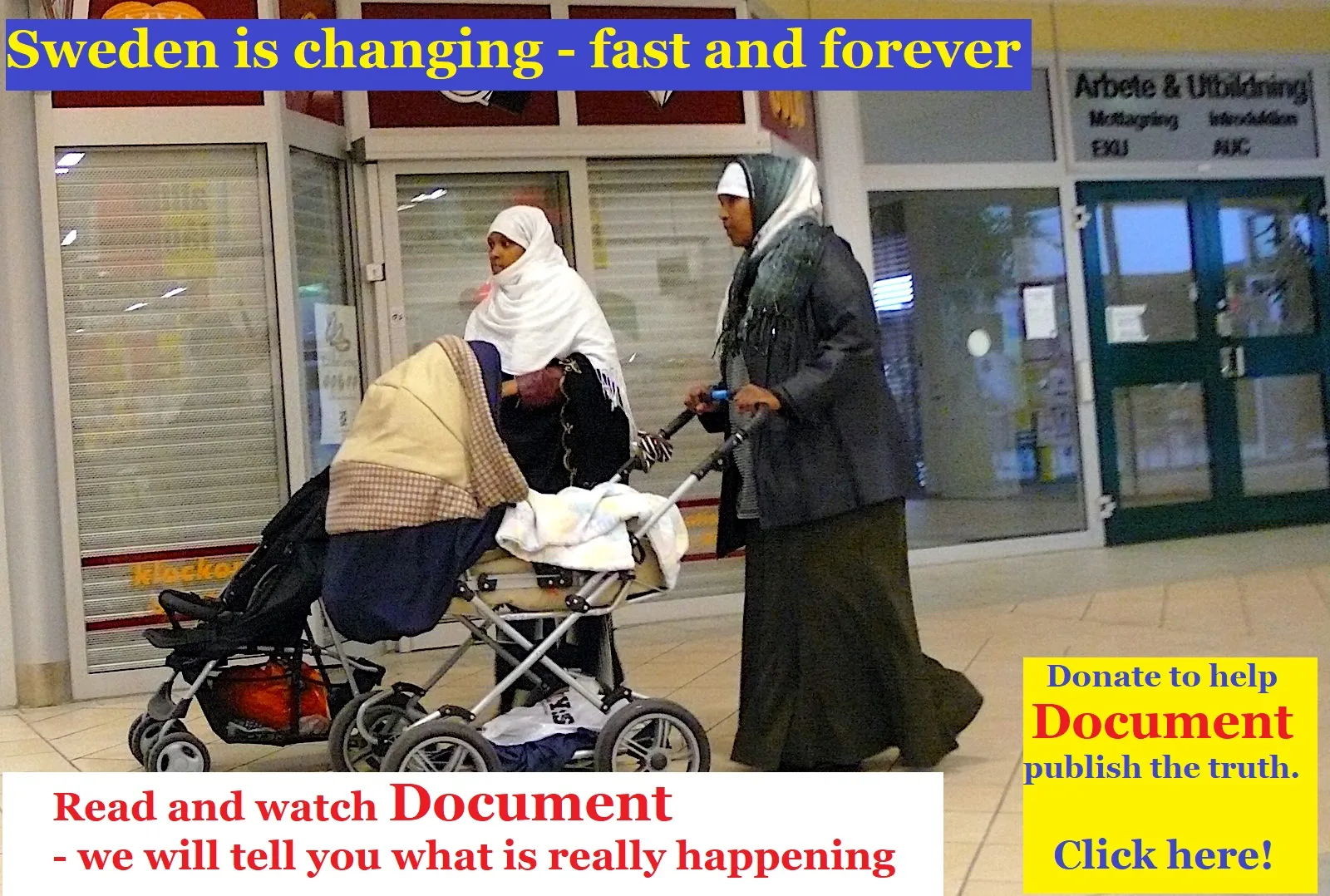Norway is the world champion in foreign aid measured by gross national income (GNI). Per capita, the country is the most generous in the world. Meanwhile, the generation that built our country is abused and neglected behind closed doors.
Knowing those facts makes NRK’s documentary Brennpunkt: Care Behind Closed Doors even more harrowing.
“Numbers that count,” Norad wrote last year.
In a press release, Norad, the Norwegian agency for development cooperation, wrote that Norway provided record–high foreign aid to the world in 2021 – as much as NOK 40.1 billion. The amount is the highest in absolute numbers ever, with an increase of 600 million from 2020.
“There is no doubt that Norway plays a central role in international development work, especially in global health. Long-term Norwegian support to large international vaccine organizations has proven to be enormously important, not only for the developing countries but also for ourselves and the whole world,” says Bård Vegar Solhjell, Director of Norad.
Solhjell is right about one thing: There is no doubt that Norway plays a central role in international development work, and the leaders in Norad have every reason to smile proudly.
“The figures also show that we can turn around and reprioritize in the face of new crises,” says Solhjell.
What if Solhjell had discussed their ability to prioritize elderly care in Norway with the same enthusiasm? There’s no doubt it is a scandalous crisis, but it is also a crisis that has lasted for decades in the socialist country.
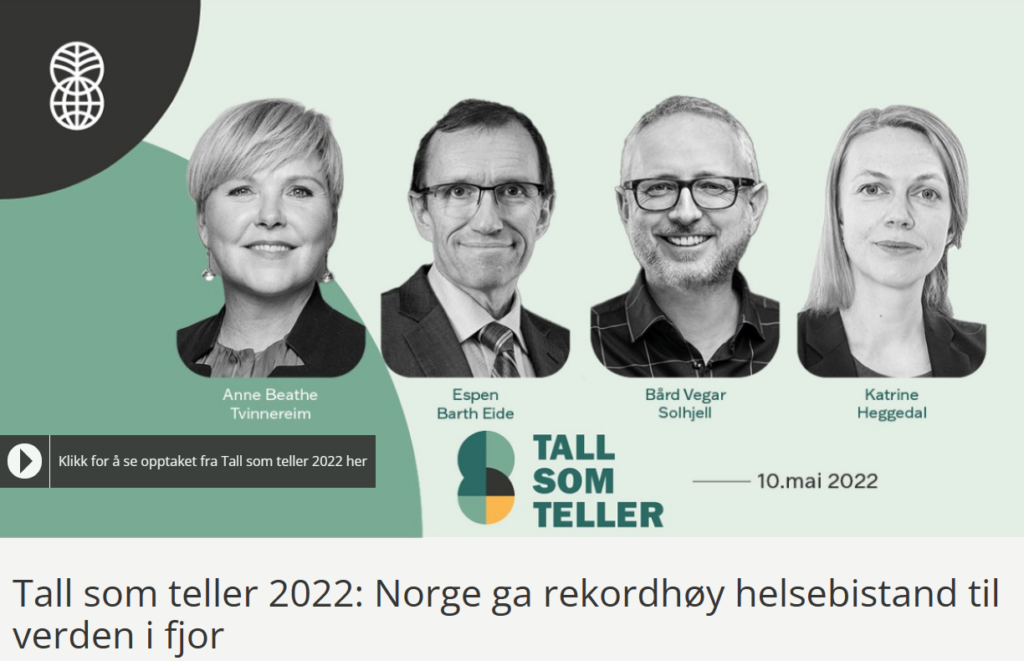
Photo: Screenshot: Norad
A shameful and unworthy elderly care
NRK’s documentary Brennpunk: Care behind closed doors is difficult to get through.
The Norwegian state-owned media, funded by taxpayers, has, for once, done investigative journalism – but it is too late. For decades, the state channel and other media have given Norwegians news about the real social problems in small doses. Documentaries like this don’t grow on trees, unfortunately. For such harrowing truths could have made a difference. It may have led politicians to address a problem that is a disgrace to Norway.
A disgrace is precisely what elderly ombudsman Bente Lund Jacobsen wrote in an op-ed after NRK’s documentary: A shameful and unworthy elderly care:
The care for the elderly that many people experience today is a disgrace to Norway. They experience refusal after refusal. Our elderly deserve better.
Sick, tired, scared, and lonely. Lack of care, food, medication, and follow-up. It is everyday life for some ill, older adults who must live at home without nursing home space, according to NRK’s documentary Care behind closed doors. Is that how we should treat our elderly?

Photo: Screenshot Nork/Sverre, 96 years old.
Sick, tired, scared, and lonely
We meet Sverre, who is 96 years old and takes medication for depression. A few years ago, his wife Johanna moved into a nursing home due to dementia. He misses her. They’ve been together for 70 years. He cannot understand that they cannot be together for the last weeks they have to live.
Johanna’s greatest wish is that they can live together again.
The municipality rejected his application when he applied to move in with her. Five times now. We watch a scene where the daughter opens a letter from the city. Once again, he is rejected in cold bureaucratic language. It’s heartbreaking to watch.
“They’re dragging it out, and they assume I will not live long,” Sverre says. “Then they’re done with it.”
“The generation that we should have carried on a golden chair, which has built up the country after the war,” cries his daughter. “And then they’re going to be treated like that. It’s awful. I can’t say anything else. It’s just painful.”
Ultimately, Sverre gets a place in the same nursing home as his wife but in a different room. She is in a closed dementia ward. They see each other once or twice a week. Sverre thought they were going to live in the same room. He doesn’t think it’s right but says he can’t do anything about it. It’s no use anymore. Sverre has resigned.
“It is the high lords who rule,” he says.
Kari wishes they could cut off her leg.
Kari is scared and feels very unsafe. She has fallen in her apartment several times. She thinks about it all the time – thinking and thinking. Kari has a wound on her leg that will not heal, and in the past year, she’s been hospitalized three times. The family has applied for a nursing home place, but the answer from the city council is no. They believe it is justifiable that she lives at home, with home care and daycare.
They have complained to the county governor, the last opportunity to appeal.
She has a security alarm but doesn’t feel safe: Suddenly, she lies on the floor. Yet she is happy that she is alive because she loves to be with her children and grandchildren.
Kari’s sons do not understand how this could happen in our welfare society. They have to fight for their mother’s right to a place in a nursing home.
Kari says she has had pain, and the wound on her leg does not heal. There’s so much “noise” with this leg. She wishes they could get rid of it, just below the knee. She’s been thinking about that for a long time now.
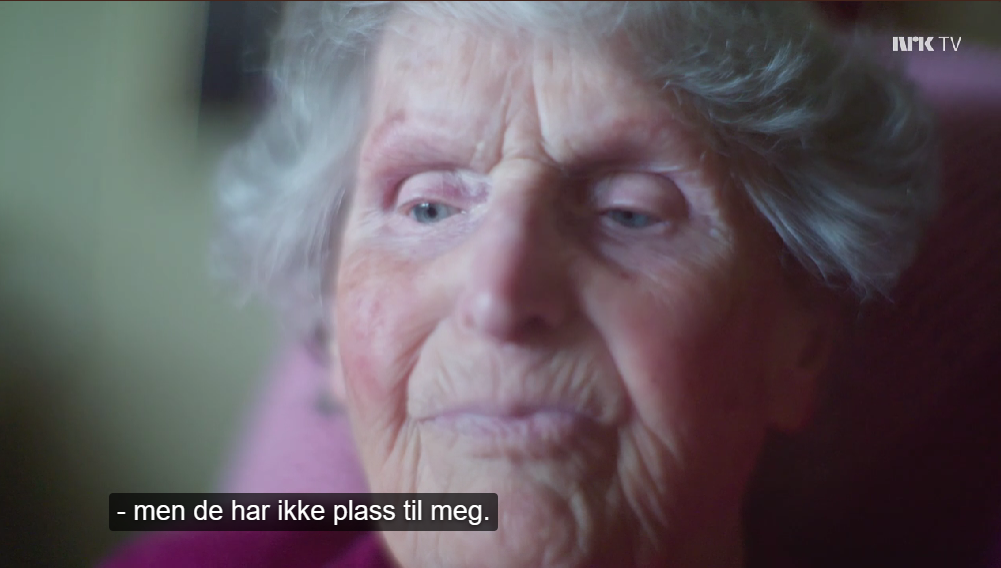
Photo: Screenshot, NRK; Kari says they don’t have room for her.
Lilly does not receive food or medication
Lilly is 90 years old and has dementia. She lives in a municipal residence of 37 square meters. Clothes cover the bedroom. She sleeps on the couch. It’s her everyday life. Her daughter has been trying to get her into a nursing home for four years. Instead, she is on a list for a care home that still needs to be built.
The daughter has often experienced Lilly not receiving food, medication, and follow-up with showering and other daily personal care.
NRK proves it with the help of a hidden camera. In 16 days, she has visits from 21 different home health aides. It doesn’t create a loving and caring relationship for someone with dementia, and Lilly is scared. Several nurses are on the phone most of the time, some speaking in a foreign language. Many are late, they don’t offer her food, and they don’t make sure she takes medicine. She is extremely malnourished.
A lot of people yell back if Lilly complains. Much of the footage shows a scared and confused lady crying, not knowing what she’s done the minute before, using the remote control to call for help in the middle of the night, and living a shameful and undignified life in one of the wealthiest countries in the world.
Lilly has an automatic box where the medications come out thrice daily. She is concerned that she takes them at the right time but does not understand the machine. Then, one night, Lilly buzzes around all night, trying to take her medication. She cries, and we can feel her pain and loneliness.
A machine cannot replace a human and cannot be used instead of care and empathy. But if we see the care she receives from the home care services, it is as useless as the automatic box for her medications.

Photo: Screenshot, Lilly, 90 years old.
While the elderly suffered, Norwegian foreign aid increased.
In 2021, Norwegian development assistance accounted for 0.93 percent of gross national income (GNI), and according to Norad, they did not reach the stated political target of one percent of GNI. But it had more to do with Norway’s GNI in 2021, primarily due to high oil and gas prices, which were much higher than expected when the original aid budget for 2021 was drawn up and adopted.
As in previous years, Norway was well above the UN target of spending 0.7 percent of GNI for aid purposes, while the average for member states is about 0.3 percent.
If we look at aid figures per capita, Norway set a world record, as shown in the graph below. Considering how politicians manage Norway’s country, it’s a big scandal. No, really; it’s criminal!
Largest donors of humanitarian aid worldwide in 2022 per Statista, based in Germany.

Photo: Graph by Elisabeth Rooney.
In addition, the state milks Norwegians for tax monies more than most countries in the world while neglecting their citizens and every public institution that is supposed to make life easier for the country’s inhabitants. Elderly care is a good example, and as an elderly ombudsman, Jacobsen writes; A disgrace for Norway.
The second episode of the Brennpunkt documentary is even more shocking and shows abuse and neglect in nursing homes and healthcare workers’ nightmarish working conditions. It may be that Sverre, Lilly, and Kari are lucky enough to arrive at one of the nursing homes that care for the elderly in a dignified way because they do exist. But if they end up in the institutions shown in the documentary, perhaps home is best.
A picture says more than a thousand words
NRK’s documentary showed clips of politicians promising better elder care from 1989 to 2017. For some reason, the state channel did not include current politicians. But really, it’s unnecessary because it’s just empty words like in 1989 and every year since.
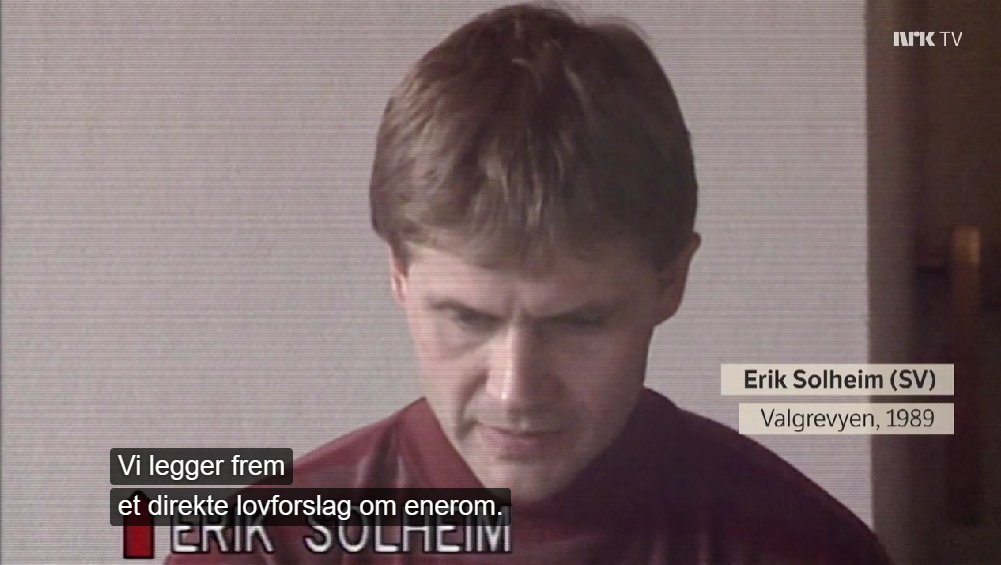
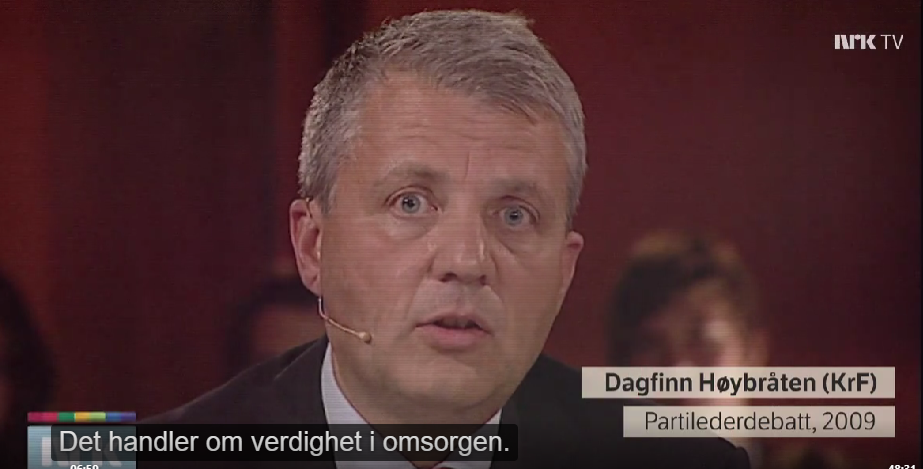
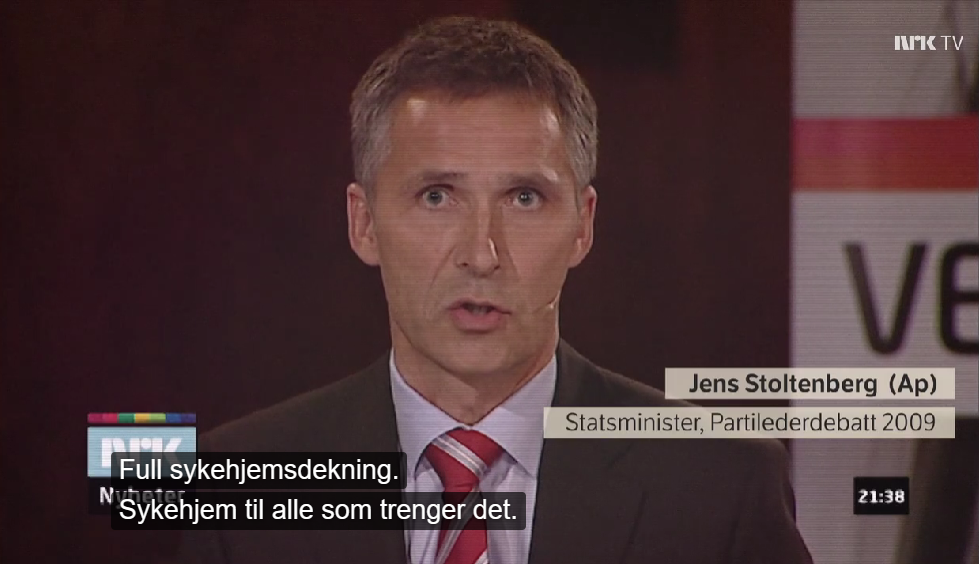
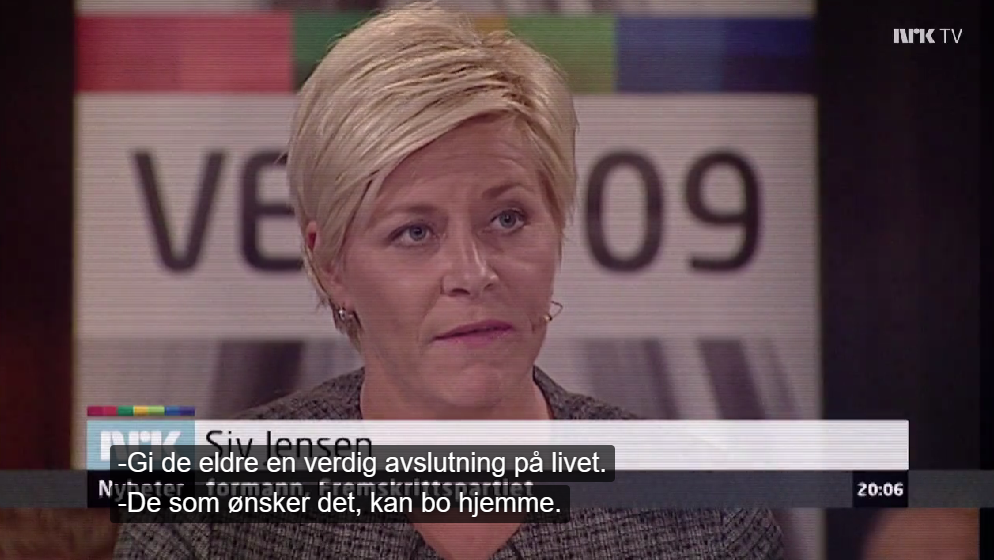
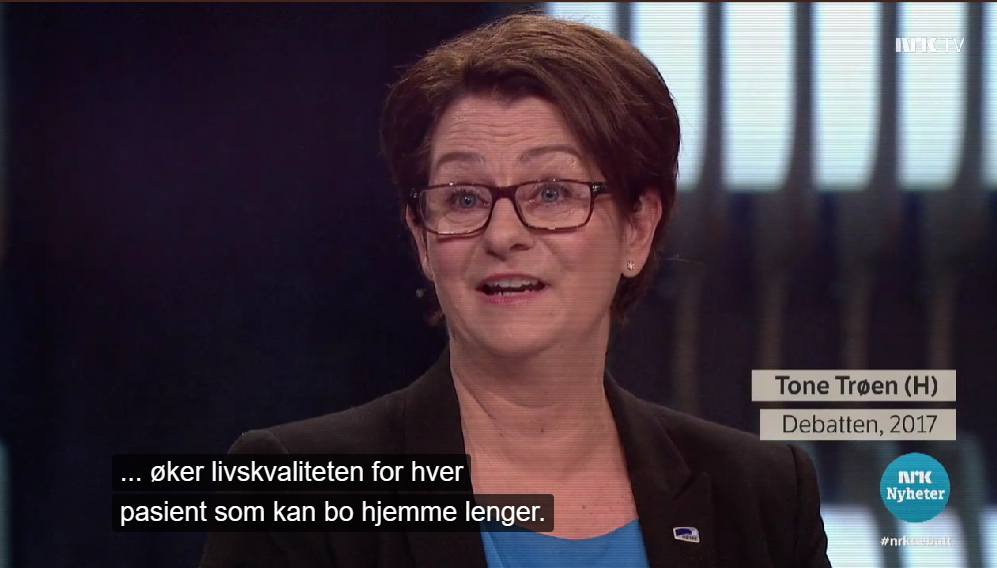
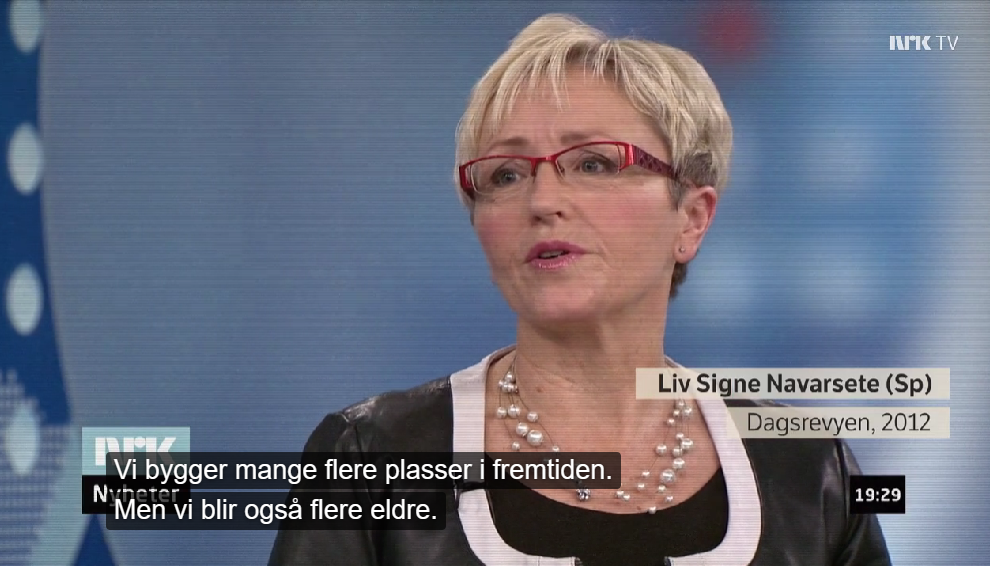
Mens eldre blir mishandlet bak lukkede dører, er Norge verdensmester i bistand – Document


